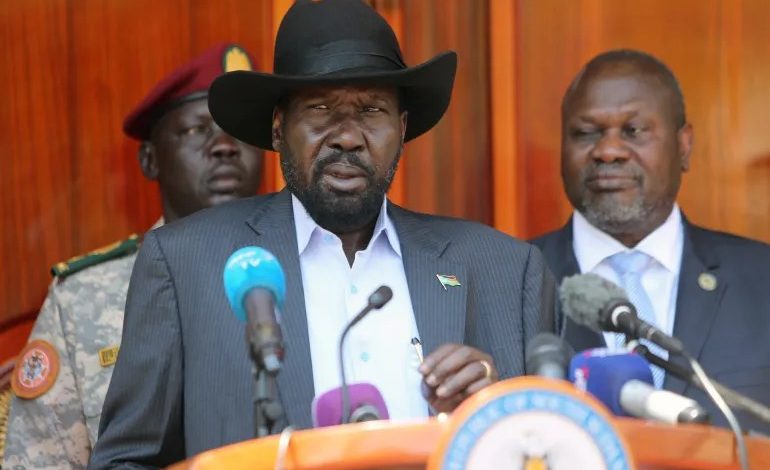What is the Future of the South Sudan Peace Agreement?

Sudan Events – Agencies
Years after the 2018 peace agreement that ended the bloody civil war in South Sudan, tensions have resurfaced, reigniting political friction between the ruling factions and the opposition within the Sudan People’s Liberation Movement.
Last week, President Salva Kiir Mayardit launched a wave of arrests targeting several prominent figures, including Minister of Petroleum Puot Kang Chol, Peace Efforts Minister Stephen Par Kuol, and Deputy Army Commander General Gabriel Duop Lam.
The arrests also extended to security personnel allied with Vice President Riek Machar.
Reports from South Sudan indicate that Vice President Machar’s residence has been under siege by government forces since last Tuesday.
How Did the Tensions Start?
Conflicting accusations persist among involved parties regarding the causes of the recent tensions. However, last week, clashes erupted between government forces and the “White Army” militia in Nasir, a town in Upper Nile State in northern South Sudan.
The White Army is considered a youth militia primarily composed of members from the Nuer ethnic group, to which Vice President Riek Machar belongs.
According to Human Rights Watch, the fighting began after rumors spread that the government intended to disarm local militias.
The organization confirmed that South Sudanese government forces attacked positions held by armed youth groups, leading to deadly clashes that resulted in at least five civilian casualties and injuries to a United Nations peacekeeper.
Government spokesperson Michael Makuei stated that the arrests were carried out because the officials allied with Machar had violated legal orders.
He accused Machar and his supporters of coordinating with the White Army to attack a military base near Nasir in early March. However, Machar has denied these allegations.
Last Friday, around 27 soldiers were killed in an attack on a UN civilian aircraft attempting to evacuate wounded and besieged government troops from Nasir.
Warnings and Concerns
Amid rising tensions, the United Nations has warned of escalating violence in South Sudan and urged all parties to remain calm and renounce violence.
Yasmin Sooka, Chairperson of the UN Human Rights Commission, cautioned that a return to conflict could undo the hard-won progress toward peace achieved over the past few years. She called for prioritizing security and stability over conflict and confrontation.
Outgoing African Union Commission Chairperson Moussa Faki also urged all South Sudanese factions to abide by the ceasefire agreement and avoid violence.
Faki stated that he is consulting with IGAD (the Intergovernmental Authority on Development) and other stakeholders to ensure a return to calm across the country.
These renewed security tensions have raised domestic and regional concerns about the possibility of another war. South Sudan previously plunged into civil war in 2013 due to disputes between Salva Kiir and his then-Vice President Riek Machar. Machar rebelled and took up arms against the government after being dismissed from office.
The war lasted five years, claiming over 400,000 lives and displacing at least one million people.
After numerous reconciliation efforts, warring factions signed the 2018 peace agreement under the sponsorship of IGAD.
The agreement was supposed to unify the military, draft a new constitution, organize elections, and disarm militias. However, these provisions have yet to be implemented, with both sides effectively maintaining only a ceasefire without fully realizing the agreement’s goals.
With tensions rising once again, the 2018 peace agreement is at risk of collapse, as its provisions remain unfulfilled despite its formal signing.
South Sudan, which gained independence from Sudan in 2011, remains one of the world’s poorest countries despite its significant oil resources.
Widespread corruption and ethnic conflicts continue to threaten stability and development in the young nation.
Source: Al Jazeera Net



